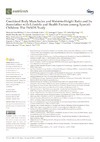Identificador persistente para citar o vincular este elemento:
https://accedacris.ulpgc.es/jspui/handle/10553/113992
| Título: | Combined Body Mass Index and Waist-to-Height Ratio and Its Association with Lifestyle and Health Factors among Spanish Children: The PASOS Study | Autores/as: | Bibiloni, María del Mar Gallardo-Alfaro, Laura Gómez, Santiago F. Waernberg, J Oses-Recalde, M Gonzalez-Gross, M Gusi, N Aznar Vallejo, Eduardo Marin-Cascales, E Gonzalez-Valeiro, M Serra Majem, Luis Terrados, N Segu, M Lassale, C Homs, C Benavente-Marin, JC Labayen, I Zapico, AG Sanchez-Gomez, J Jimenez-Zazo, F Alcaraz, PE Sevilla-Sanchez, M Herrera-Ramos, E Pulgar, S Sistac, C Schroder, H Bouzas, C Tur, JA |
Clasificación UNESCO: | 3206 Ciencias de la nutrición | Palabras clave: | Mediterranean diet Lifestyle Children Adolescents PASOS |
Fecha de publicación: | 2022 | Proyectos: | CB12/03/30038 Fundación PROBITAS Gasol Foundation Barça Foundation, Banco Santander, IFA, Vienna and the Fundación Deporte Joven |
Publicación seriada: | Nutrients | Resumen: | Background and Aims: The World Health Organization recommended simultaneous measurement of body mass index (BMI) and waist circumference (WC) and suggested joint use to predict disease risks. The aim of this study was to assess the prevalence of BMI and waist-to-height ratio (WHtR) categories among Spanish children and adolescents, as well as their associations with several lifestyle factors. Methods: Cross-sectional analysis of 8–16-year-old children and adolescents (n = 3772) were included in the PASOS nationwide representative study. Chil-dren/adolescents and their mothers/female caregivers answered a questionnaire on lifestyle and health factors. Child/adolescent anthropometrics were measured. Four combined BMI-WHtR disease risk categories were built. Results: A third of participants showed combined BMI-WHtR categories with high disease risk (12.3% ‘increased risk’, 9.7% ‘high risk’, 14.3% ‘very high risk’). Participants in the ‘very high risk’ group were less likely to be females (odds ratio 0.63; 95% CI: 0.52–0.76) and adolescents (0.60; 95% CI: 0.49–0.72), to practice ≥60 min/day of moderate-vigorous physical activity (MVPA) (0.73; 95% CI: 0.57–0.93), and to watch <120 min/day of total screen time on weekdays (0.61; 95% CI: 0.49–0.76). Mothers of participants in the ‘very high risk’ group were less likely to have a high educational level, be in the overweight or normal range, have never smoked or were former smokers, and watch <120 min/day of total screen time on weekends. Participants in the ‘increased’ and ‘high risk’ categories had mothers with normal weight and ≥60 min/day of MVPA. Participants in the ’high risk’ group did not achieve ≥60 min/day of MVPA and showed lower adherence to the Mediterranean diet. Conclusions: Adherence to a healthy lifestyle in children and adolescents, but also in their mothers/female caregivers during offspring’s childhood and adolescence, is associated with low BMI-WHtR disease risk. | URI: | https://accedacris.ulpgc.es/handle/10553/113992 | ISSN: | 2072-6643 | DOI: | 10.3390/nu14020234 | Fuente: | Nutrients [ISSN 2072-6643], v. 14 (2), 234, (Enero 2022) |
| Colección: | Artículos |
Citas SCOPUSTM
7
actualizado el 08-jun-2025
Citas de WEB OF SCIENCETM
Citations
6
actualizado el 01-feb-2026
Visitas
242
actualizado el 15-ene-2026
Descargas
94
actualizado el 15-ene-2026
Google ScholarTM
Verifica
Altmetric
Comparte
Exporta metadatos
Los elementos en ULPGC accedaCRIS están protegidos por derechos de autor con todos los derechos reservados, a menos que se indique lo contrario.
